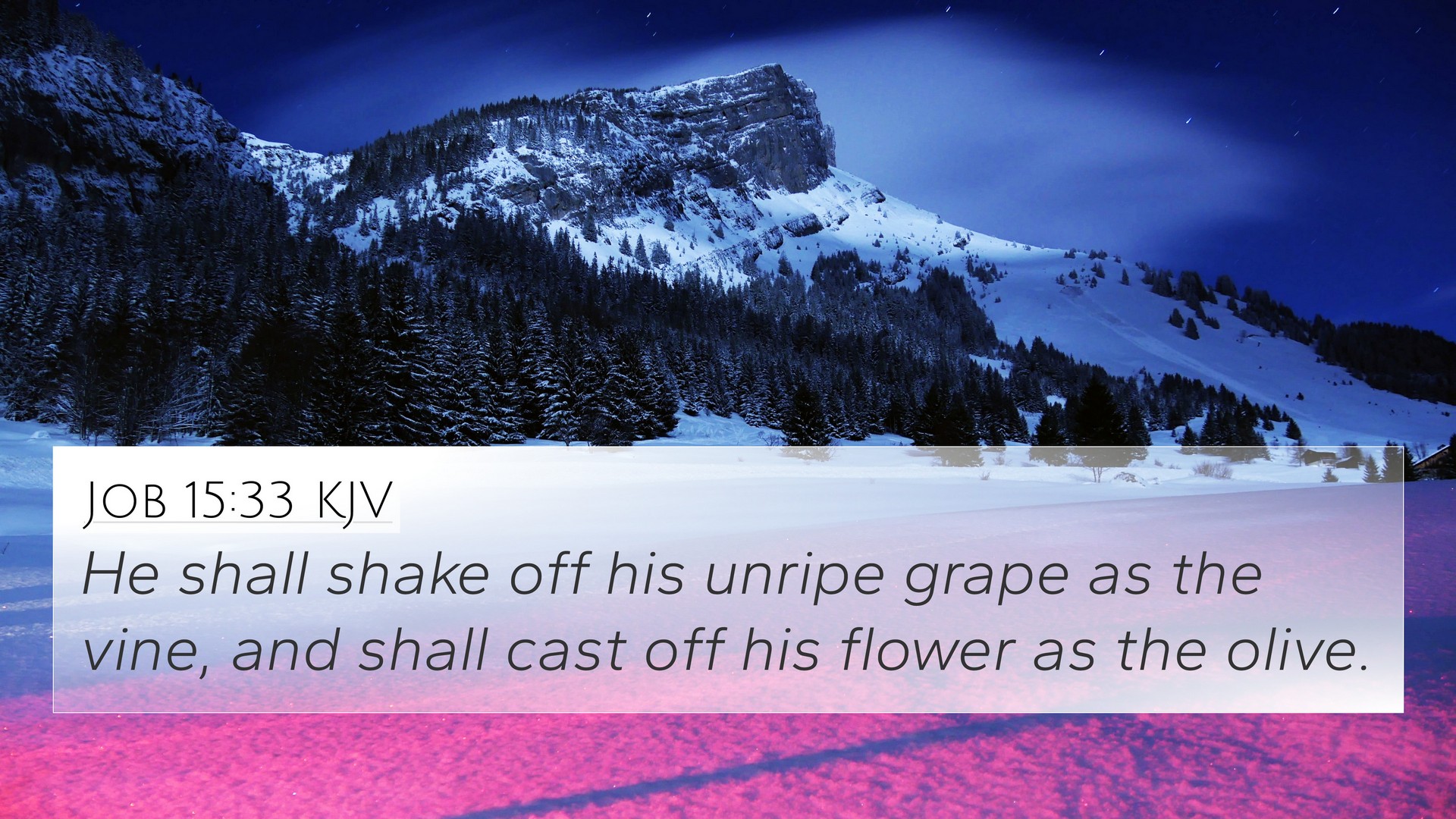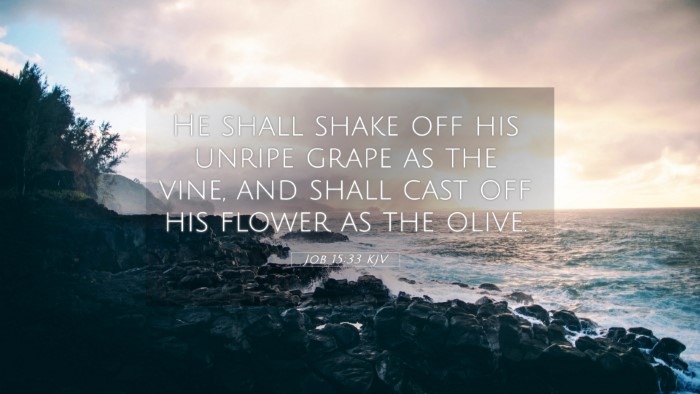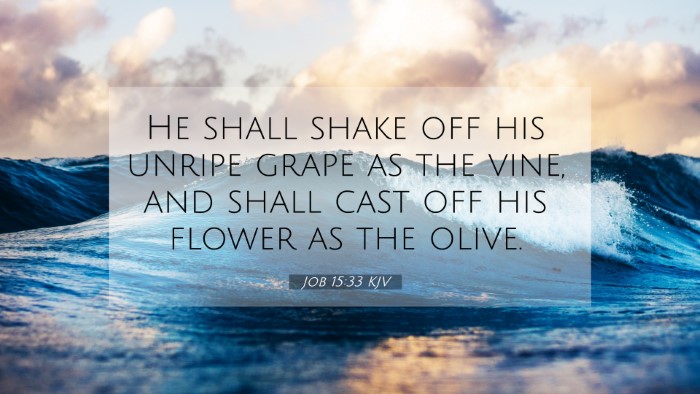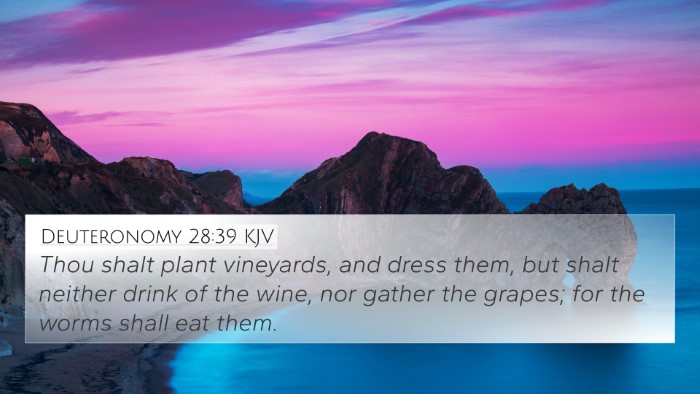Understanding Job 15:33: A Summative Commentary
Verse Context: Job 15:33 states, “He shall shake off his unripe grape, as the vine, and shall cast off his flower, as the olive.” This verse is set within a dialogue between Eliphaz and Job, where Eliphaz is asserting Job's perceived unrighteousness and the consequences that follow.
Meaning and Interpretation
This verse conveys profound themes about the nature of destruction and disfavor. Eliphaz uses the imagery of grapevines and olive trees to articulate the fate of the wicked. The metaphor suggests that just as an unripe grape and a flower cast off signify a lack of value or worthiness, so too does the life of a sinner be cut off before reaching maturity.
- Matthew Henry's Commentary:
Henry interprets the verse as a declaration of the judgment upon those who do not stand right with God. He emphasizes that God, like a gardener, tends to His field; He prunes away the unworthy plants to maintain the health of His creation.
- Albert Barnes' Notes:
Barnes views this metaphor as an assertion of divine retribution. He underscores that the removal of the unfit is a necessary process for the sustenance of the whole—highlighting God's ultimate authority in determining worth and purpose within His creation.
- Adam Clarke’s Commentary:
Clarke elaborates on the significance of the vine and olive, drawing parallels to the blessings of Israel and the consequences faced by those who turn away from God. He points out the agricultural metaphors prevalent in Scripture, which illustrate spiritual truths.
Cross-References to Consider
In exploring Job 15:33, it is beneficial to look at related verses that deepen our understanding:
- John 15:2: “Every branch in me that beareth not fruit he taketh away: and every branch that beareth fruit, he purgeth it, that it may bring forth more fruit.”
- Isaiah 27:10: “Yet the defenced city shall be desolate, and the habitation forsaken, and left like a wilderness: there shall the calf feed, and there shall he lie down, and consume the branches thereof.”
- Lamentations 5:17: “For this our heart is faint; for these things our eyes are dim.”
- Matthew 21:19: “And seeing a fig tree by the way, he came to it, and found nothing thereon, but leaves only, and said unto it, Let no fruit grow on thee henceforward for ever. And presently the fig tree withered away.”
- Psalms 1:4-5: “The ungodly are not so: but are like the chaff which the wind driveth away. Therefore the ungodly shall not stand in the judgment, nor sinners in the congregation of the righteous.”
- Matthew 7:19: “Every tree that bringeth not forth good fruit is hewn down, and cast into the fire.”
- Luke 13:9: “And if it bear fruit, well: and if not, then after that thou shalt cut it down.”
Applying the Themes
The themes present in Job 15:33 resonate with the broader message of the Bible regarding judgment, righteousness, and divine authority. By linking this verse to others, such as those in John and Matthew, we can analyze how the Bible cross-references essential truths about God’s will regarding the righteous and the wicked.
Tools for Bible Cross-Referencing
To enhance your understanding and facilitate deeper study of biblical texts, consider utilizing:
- Bible Concordance: A comprehensive tool for locating verses related to key terms and themes.
- Bible Cross-Reference Guide: These guides provide thematic connections across scriptures.
- Bible Chain References: Utilizing chains enables the reader to follow themes across different books and verses.
How to Use Bible Cross-References
When studying the Bible, identifying connections between verses enhances understanding. Here are a few tips:
- Identify Key Themes: Look for repeated concepts such as righteousness, judgment, and divine pruning.
- Compare Different Books: Look at parallels in prophetic books, the Gospels, and epistles.
- Use a Cross-Reference System: Engage with resources that outline connections between verses explicitly.
Conclusion
Job 15:33 serves as a poignant reminder of the importance of being in right standing with God. The imagery of fruit and harvest invites readers to reflect on their spiritual health and the divine pruning process. By examining related verses and utilizing cross-referencing tools, one can gain a comprehensive understanding of the biblical narrative surrounding judgment and righteousness.
As you continue your journey through scripture, consider how these verses dialogue with each other, enriching your faith and understanding of God’s character.





